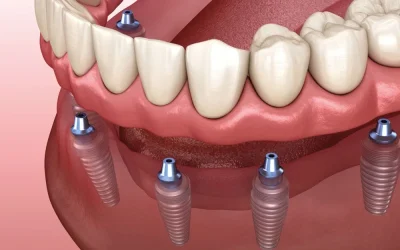Missing teeth are not just an aesthetic issue but also a significant health concern that affects chewing function and lowers quality of life. Modern dentistry offers one of the most effective solutions to this problem through dental implant treatment. Titanium screws placed in the jawbone support prostheses, allowing patients to regain the feeling of natural teeth. At Sevenhills Dental Clinic, we strive to provide our patients with a comfortable and professional experience throughout this process. In this blog, we will answer all your questions about the treatment process by detailing each stage of implant treatment.
Initial Check and Treatment Plan
The first step to a successful implant treatment is a thorough examination and careful planning. During your initial appointment, the dentist will assess your overall health and oral structure in detail. This evaluation includes checking whether your jawbone can support the implant, assessing your gum health, and reviewing your general oral hygiene. Advanced technologies such as panoramic X-rays and 3D imaging help analyze jawbone density and the location of neurovascular structures.
In the treatment planning phase, both the implant placement area and the type of dental prosthesis to be used after treatment are determined. For instance, treating a single missing tooth differs from addressing complete tooth loss, requiring different approaches. Additionally, the treatment stages, healing process, and possible alternatives are discussed with the patient during this examination. A well-planned start ensures a smoother, more successful treatment process.
Dental Implant Placement
Dental surgery is the most crucial stage of dental implant treatment, where the implant is placed into the jawbone to create a permanent tooth root. To ensure a painless experience, local anesthesia is administered before the procedure. In more sensitive or complex cases, sedation or general anesthesia may be used.
The surgeon carefully prepares the implant site using specialized tools before securely placing the implant into the jawbone. When performed with the right technique, this procedure is typically quick and comfortable. Achieving complete compatibility between the implant and the jawbone requires advanced surgical skills and the expertise of an experienced dentist.
After the surgery, the implant is covered with gum tissue, allowing the healing process to begin. If necessary, a temporary prosthesis may be placed at this stage to address aesthetic concerns.
Healing Process (Osteointegration)
The fusion of the implant with the jawbone is one of the most critical stages of treatment. During this period, a biological bond forms between the implant surface and the bone tissue. This process, known as osseointegration, typically takes 2 to 4 months, though the exact duration depends on factors such as bone density, overall health, and the implant placement area.
Maintaining excellent oral hygiene is essential during healing. Patients should follow their dentist’s recommendations for brushing, flossing, and rinsing. Additionally, avoiding hard foods that could put stress on the implant site is crucial. Regular check-up appointments allow the dentist to monitor the implant’s integration and bone condition, enabling early detection and prevention of potential complications.
Prosthetic Placement
Once osseointegration is complete, the final stage of the treatment begins: placing the dental prosthesis. At this stage, an abutment is attached to the implant, serving as a crucial connector between the implant and the prosthesis.
The prosthesis is custom-designed to match the patient’s needs and aesthetic preferences. Factors such as color, shape, and size are carefully selected to ensure a natural appearance. Once the prosthesis is securely fixed to the abutment, it functions like a permanent tooth. Depending on the patient’s condition, the prosthesis can be either fixed or removable.
Fixed dental prostheses provide a more natural look and feel, while removable options may be more suitable in certain cases. After this step, the patient regains a complete smile, both aesthetically and functionally.
Post-Treatment Dental Implant Care
The success of implant treatment largely depends on the patient’s commitment to oral hygiene and regular check-ups after the procedure. During the first year, frequent monitoring of the tissues surrounding the implant is essential. Establishing a consistent routine of brushing and flossing is crucial for maintaining oral health.
Following a nutritious diet also plays a key role in the longevity of the implant. Consuming foods rich in calcium and vitamin D helps strengthen the jawbone, while smoking can negatively impact implant success, making it advisable to quit. Additionally, professional cleanings and annual dental check-ups contribute to a healthier oral structure and extend the lifespan of the implant.
Get Implant Treatment at Sevenhills Dent Clinic!
Implant treatment not only restores missing teeth but also boosts self-confidence and enhances overall quality of life. At Sevenhills Dent Clinic, we are committed to providing the highest quality care throughout this process. With our expert team and advanced technology, we prioritize both your health and aesthetics. If you are seeking a permanent solution for missing teeth, contact us today to schedule an appointment and take the first step toward a healthier, more confident smile.
Dental Implants Treatment FAQ
How painful is getting a dental implant?
At Sevenhills Dental Clinic, patient comfort is our priority. The implant procedure is performed under local anesthesia, ensuring that you do not feel pain during surgery. In more complex cases, sedation or general anesthesia may be used. After the procedure, mild discomfort or swelling is normal, but this can be managed with prescribed painkillers and proper care. Most patients report that the process is far less painful than expected, similar to a routine tooth extraction.
Will insurance pay for dental implants?
Many international patients choose to undergo implant treatment in Turkey because of the significantly lower costs compared to Western countries, even without insurance coverage. At Sevenhills Dental Clinic, we offer transparent pricing and high-quality care at a fraction of the cost found abroad.
How long does dental implants last?
With proper care, dental implants can last a lifetime. The titanium implant itself is designed to be a permanent replacement for the tooth root, while the prosthetic crown typically lasts 10–15 years before needing replacement due to normal wear. Maintaining good oral hygiene, attending regular dental check-ups, and avoiding harmful habits like smoking can significantly extend the lifespan of your implant.
How long do you go without teeth when getting implants?
The time without teeth depends on the treatment plan. In many cases, if sufficient bone density is present, we can place a temporary prosthesis immediately after surgery, allowing you to maintain aesthetics and function while healing. However, in traditional implant procedures, patients may need to wait 2–4 months for osseointegration (implant fusion with the jawbone) before receiving a permanent prosthesis. At Sevenhills Dental Clinic, we personalize the process to minimize your time without teeth.
Who should not get dental implants?
While dental implants are a great solution for most patients, they may not be suitable for individuals with certain conditions, such as:
- Severe bone loss in the jaw without the option for bone grafting
- Uncontrolled diabetes, which can slow healing
- Heavy smoking, which increases the risk of implant failure
- Autoimmune diseases or medications that impair healing
- Patients undergoing chemotherapy or radiation therapy in the jaw area
Is there a cheaper alternative to dental implants?
Yes, for patients looking for a more affordable solution, alternatives include:
- Dental bridges – A fixed option that relies on neighboring teeth for support
- Removable dentures – A more budget-friendly but less stable solution
- Mini implants – A cost-effective alternative for some cases
However, dental implants remain the most durable and natural-looking option. Many international patients choose Turkey for implant treatment due to the lower costs compared to Europe and the U.S., while still receiving high-quality care.
At what age should you not get implants?
Dental implants are generally not recommended for individuals under 18 years old, as the jawbone is still developing. There is no upper age limit, and many older adults successfully receive implants. As long as a patient has sufficient bone density and is in good health, age is not a barrier. At Sevenhills Dental Clinic, we assess each patient’s condition individually to ensure the best outcome.
Can your body reject metal implants years later?
While extremely rare, implant failure can occur years later due to factors such as infection (peri-implantitis), bone loss, or an autoimmune reaction. Titanium implants are biocompatible and designed to integrate with the jawbone, but in very rare cases, the body may react negatively. Regular dental check-ups and good oral hygiene significantly reduce the risk of complications.





